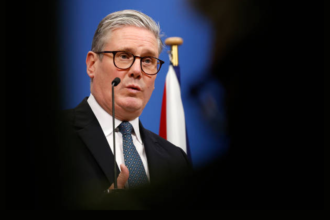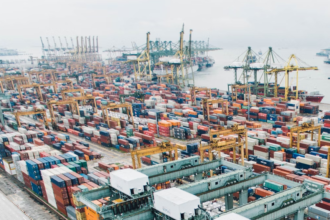Announcing broad new US tariffs on all goods entering the country, President Donald Trump has caused the worst disruption in the global trade system since the wake-up call following World War Two. Reflecting his suggestion during last year’s White House campaign, his plan sets a baseline tariff of 10% on all imports.
- How Will the New US Tariffs Affect the World Economy?
- Which nations will have the highest tariffs?
- Will Other Nations Respond?
- What immediate effects will the tariffs have?
- What immediate effects will the tariffs have?
- Reaction of Markets to the Announcement
- What Other Trade Policies Has Trump Pronounced?
The new measures include higher tariffs for roughly 60 trade partners judged “the worst offenders,” including the European Union and China. Trump said that these US tariffs are aimed at recovering US economic independence and are a reaction to unfair trade policies.
“For more than five decades, America has been looted, pillaged, raped, and plundered by nations near and far, both friend and enemy alike,” Trump said during his White House Rose Garden speech. “Today, we are finally putting America first, and we are standing up for the American worker.
Trump has repeatedly maintained that past trade policies have undermined the US economy, resulting in job losses in manufacturing and other sectors. According to the government, these new US tariffs will inspire businesses to manufacture items locally, thereby generating fresh employment and long-term economic strengthening.
How Will the New US Tariffs Affect the World Economy?
Analysts caution that the action would raise American consumers’ prices and slow US economic growth. Some nations worldwide could find themselves in recession. “He just dropped a nuclear bomb on the global trading system,” said a former top economist.
The nonpartisan Congressional Budget Office projects that by 2034, the import levies will bring in $2.2 trillion. The declaration corresponds with past US levies on Chinese imports, including foreign automobiles, steel, and aluminum. It also includes a 25% fee on some goods from Mexico and Canada, although the White House indicated that commerce with those two nations would not be affected by these most recent rounds of US taxes for now.
These tariffs have financial consequences beyond quick price increases. Economists project that American businesses that depend on imported items for manufacturing will face higher expenses, possibly resulting in job losses or activity migration abroad. Small companies that rely on reasonably priced imports could also find it difficult to stay competitive in the market.
Which nations will have the highest tariffs?
The new tariffs will set varying prices based on the nation:
- The United Kingdom will be liable for a 10% duty.
- A 20% tariff will be imposed on the European Union.
- Following a new 34% tax on top of an already 20% levy, goods from China will now be liable for at least 54%.
- There will be a 24% duty on Japanese goods.
- Products from India will be liable for 26%.
- Vietnam’s tariff will be 46%; Cambodia’s will be 49%.
- Some of the highest tariffs will burden smaller countries; Lesotho pays a 50% charge on exports.
These policies especially affect nations experiencing an increase in investment as businesses relocated supply chains outside of China during Trump’s first term. With many companies moving to Vietnam and other Southeast Asian countries to escape past tariffs, this most recent action will disrupt supply chains once more, hence raising prices for international companies.
Will Other Nations Respond?
Treasury Secretary Scott Bessent cautioned other countries against reprisals. “My advice to every nation right now is: Do not retaliate,” he said in an interview. Sit back, absorb it, and let us monitor things. You will escalate if you retaliate, and this is the high point should you not retaliate. “
China’s trade ministry adamantly rejected the US tariffs despite the warning, pledging “resolute countermeasures to safeguard its rights and interests.” Meanwhile, European Commission President Ursula von der Leyen said that should negotiations fail, she was ready to act further against the US.
A worldwide trade war looms as other nations investigate countermeasures. Historically, tariff increases have resulted in reciprocal acts whereby countries impose their trade restrictions in reaction. This cycle may cause more upheaval in the global economy, therefore influencing markets and sectors worldwide.
What immediate effects will the tariffs have?
The new obligations will impact trillions of dollars in commerce, most likely leading to higher US goods prices, including toys, bicycles, European wine, and clothes. A top economist at a reputable credit rating firm claims that the new US tariff system will return US trade policy to what it was in 1910.
“Many countries will most certainly find themselves in a recession,” he cautioned.
As businesses shift higher import charges onto consumers, the cost of commonplace goods for American consumers is predicted to climb. In sectors like electronics, where parts are imported from all over the world, consumers could find notable price increases. Retailers depending on foreign-made goods—including small firms and big chains—will have to change their pricing policies or look for other sources.
What immediate effects will the tariffs have?
The new obligations will impact trillions of dollars in commerce, most likely leading to higher US goods prices, including toys, bicycles, European wine, and clothes. A top economist at a reputable credit rating firm claims that the new US tariff system will return US trade policy to what it was in 1910.
“Many countries will most certainly find themselves in a recession,” he cautioned.
As businesses shift higher import charges onto consumers, the cost of commonplace goods for American consumers is predicted to climb. In sectors like electronics, where parts are imported from all over the world, consumers could find notable price increases. Retailers depending on foreign-made goods—including small firms and big chains—will have to change their pricing policies or look for other sources.
Reaction of Markets to the Announcement
Investors did not react immediately since the US stock market was closed at the time of the announcement. Early trade in Asian markets, however, revealed worries about the US tariff impact. The Nikkei 225 for Japan sank 4% in early trading, and the ASX 200 for Australia dropped 2%.
A financial analyst said the new US taxes were “worse than the worst case” that investors had expected. Still, he also hoped that exemptions and discussions would help lessen the effects.
Anticipated trade restrictions could cause stock values to drop in response to European and American companies with a large worldwide presence. These days, investors are closely examining possible exclusions, trade deals, and ongoing changes in the state of the world economy.
What Other Trade Policies Has Trump Pronounced?
Trump said his measures are “reciprocal,” and they offset rules enforced by other nations, Value-Added Tax (VAT) systems, and excessive taxes.
Among the extra steps revealed:
- Plans to revoke tax-free treatment for small packages from China beginning in May will affect stores like Shein and Temu.
- Set to start at midnight, a 25% tax on all imported autos.
- Separate tariffs will be applied to some items, notably copper and medications, which were previously exempt from Wednesday’s declaration.
With this broad economic move, Trump has emphasized that these actions represent a turning point in US trade policy, and dubbed the day of the announcement “Liberation Day.”
The wider ramifications of this change in direction will take time to show. Although the government claims these restrictions will help American workers and manufacturers, others contend that history has proven that protectionist policies sometimes result in economic downturns and unexpected effects. The global trade community is now attentively observing governments and companies responding to this unparalleled change in world trade.








